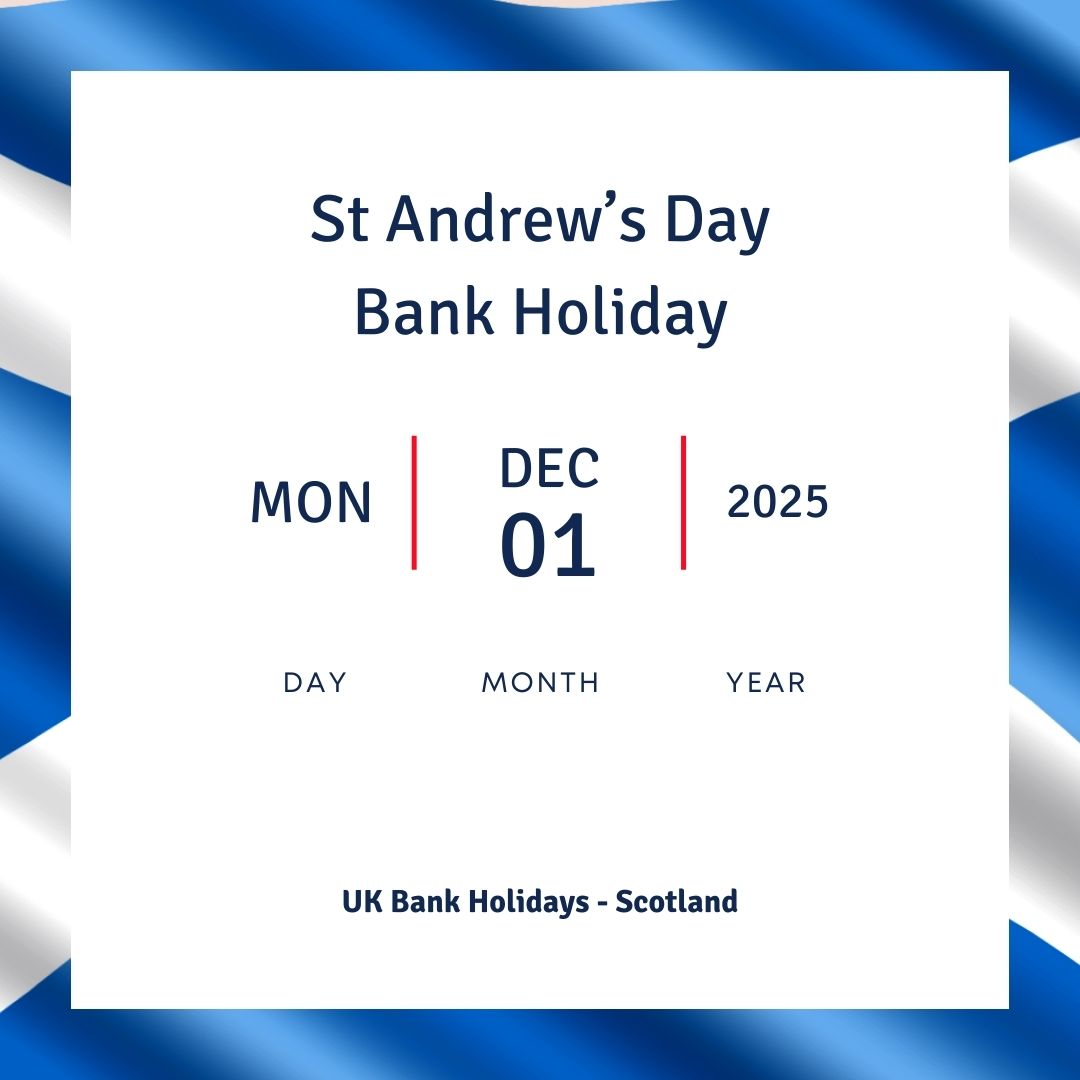UK Bank Holidays
Everybody looks forward to a bank holiday!
UK bank holidays! Everybody looks forward to a bank holiday! England, Wales, Scotland and Northern Ireland share eight holiday dates in common.
Each year, New Year’s Day, Good Friday, Easter Monday (excluding Scotland), May Day, Spring Bank Holiday, Summer (August), Christmas Day and Boxing Day are all UK wide public holidays.
Bank holidays vary slightly across the UK’s regions: England and Wales share identical bank holidays, with 8 in 2026. These are tied to Christian traditions and seasonal changes. while Scotland and Northern Ireland have additional days.
In 2026, England and Wales will have 8 bank holidays, Scotland 9, and Northern Ireland 10. This is standard, though occasional extra days are added for royal events.
Bank Holidays in England and Wales

New Year Bank Holiday
The first bank holiday of the year.
January 1st 2025

Good Friday Bank Holiday
The first Easter bank holiday.
April 18th 2025

Easter Monday Bank Holiday
The first Easter bank holiday.
April 21st 2025

Early May Bank Holiday
The daffodils will be out on the first bank holiday in May.
May 5th 2025

Spring Bank Holiday
A day off on the last Monday in May
May 26th 2025

Summer Bank Holiday
August Bank holiday sees summer events take place up and down the country.
August 25th 2025

Christmas Bank Holiday
Christmas Bank Holiday, the height of the festive season.
December 25th 2025

Boxing Day
One of two Bank Holidays in December.
December 26th 2025
Bank Holidays in Britain
Some of the dates change from year to year. For example, if a bank holiday falls on a weekend, then the next weekday will be a bank holiday. This is usually on the following Monday.
1 January (or next weekday), Good Friday, Early May Bank Holiday (first Monday in May), Spring Bank Holiday (last Monday in May); Summer Bank Holiday (first Monday in August), Christmas Day (or next nearest weekday), Boxing Day (or next nearest weekday after Christmas).
Scotland
In Scotland bank holidays are mostly the same as the rest of Britain. Except there is no Easter Monday bank holiday and an additional day at the beginning of January.
Scottish national day, St Andrews Day on 30th November is on the calendar, as well as the holiday dates listed above. St Andrew’s Day has been a public holiday in Scotland since 2007 with the the St Andrew’s Day Bank Holiday (Scotland) Act. Scottish Summer bank holiday is held earlier than in England and Wales, on the first Monday in August.
Scotland has 9 bank holidays in 2026, including unique days; 2nd January and St. Andrew’s Day. Unlike other regions, Scotland’s summer holiday is earlier, and Easter Monday is not a standard bank holiday (though some employers offer it).
In total, there are nine official bank holidays in Scotland.
1 January (or next weekday); 2 January (or first weekday after New Year’s Day Holiday), Good Friday, Early May Bank Holiday (first Monday in May), Spring Bank Holiday (last Monday in May), Summer Bank Holiday (first Monday in August); St Andrew’s Day (or next weekday), Christmas Day (or next nearest weekday); Boxing Day (or next weekday after Christmas).

2nd January Bank Holiday
A welcome day off after the Hogmanay celebrations.
January 2nd 2025

St Andrew’s Bank Holiday
A National day celebrating Scotland’s Patron Saint.
December 1st 2025
Northern Ireland
Like Scotland, Northern Ireland has a couple of extra days. There are ten bank holidays in Northern Ireland each year.
In total, there are ten official bank holidays in Northern Ireland.
Northern Ireland has 10 bank holidays in 2026, the most in the UK, including St. Patrick’s Day and the Battle of the Boyne (Orangemen’s Day). Combining English holidays with local cultural ones.
Northern Ireland celebrates March 17th St. Patrick’s Day and July 12 (Battle Day on the Boyne River) with a bank holiday.
St Patrick’s Day (17 March) became an official bank holiday in 1903. The 12 July, the Anniversary of the Battle of the Boyne, was made official in 1926

St Patrick’s Bank Holiday
Celebrating Ireland’s patron Saint and national day.
March 17th 2025

Orange Day Bank Holiday
This day is also known as Orangemen’s Day, the Glorious Twelfth and ‘the Twelfth’.
July 12th 2025
What is a Bank Holiday?
A bank holiday is a public holiday in the UK. We use the word bank because they first appeared in the 19th century with the introduction of the Bank Holidays Act of 1871.
The term “bank holiday” refers to the fact that banking institutions typically close for business on such holidays, as they once used to do on certain Saint’s days. The calendar of saints is the traditional Christian method of organising a liturgical year by associating each day with one or more saints and referring to the day as the feast day or feast of said saint.
Are National Days Bank Holidays?
The national days of England, Ireland Scotland and Wales are not all bank holidays. Only Ireland and Scotland have a bank holiday falling on their national day.
The National St David’s Day parade is held in the centre of Cardiff every year, with lots of exciting performances by dragons and theatre groups. In Wales, there is generally much support for St David’s Day becoming a bank holiday. So much so, that recently Gwynedd Council has decided to make March 1st a public holiday.
When was the first UK Bank Holiday?
Traditionally, the Bank of England observed saints’ days and religious festivals as holidays. Before 1834, the Bank of England observed around 33 saints’ days and religious festivals as holidays, but these were reduced over time.
Bank holidays were first introduced by the Bank Holidays Act of 1871, which originally created just four holidays in England, Wales and Northern Ireland, and five in Scotland. Good Friday, 1st May, 1st November, and Christmas Day.
Christmas Day and Good Friday were already traditionally observed religious holidays.
Whit Monday became a bank holiday
Whit Monday was traditionally celebrated in England, Wales and Northern Ireland, between 11 May and 14 June each year. In 1971 it was changed to a fixed spring holiday on the last Monday in May.
UK Bank Holiday Events
There are regular bank holiday events and parties all around the country.


